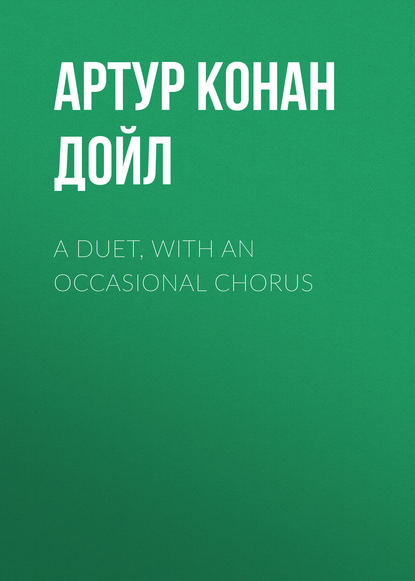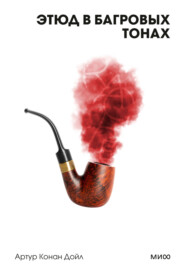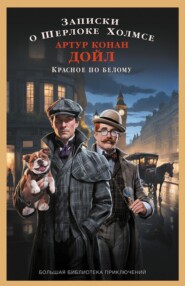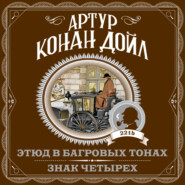По всем вопросам обращайтесь на: info@litportal.ru
(©) 2003-2025.
✖
A Duet, with an Occasional Chorus
Настройки чтения
Размер шрифта
Высота строк
Поля
‘Well, then, first of all I vote that we go and have some lunch.’
They started across the station yard, and passed the beautiful old stone cross. Among the hansoms and the four-wheelers, the hurrying travellers, and the lounging cabmen, there rose that lovely reconstruction of mediævalism, the pious memorial of a great Plantagenet king to his beloved wife.
‘Six hundred years ago,’ said Frank, as they paused and looked up, ‘that old stone cross was completed, with heralds and armoured knights around it to honour her whose memory was honoured by the king. Now the corduroyed porters stand where the knights stood, and the engines whistle where the heralds trumpeted, but the old cross is the same as ever in the same old place. It is a little thing of that sort which makes one realise the unbroken history of our country.’
Maude insisted upon hearing about Queen Eleanor, and Frank imparted the little that he knew as they walked out into the crowded Strand.
‘She was Edward the First’s wife, and a splendid woman. It was she, you remember, who sucked the wound when he was stabbed with a poisoned dagger. She died somewhere in the north, and he had the body carried south to bury it in Westminster Abbey. Wherever it rested for a night he built a cross, and so you have a line of crosses all down England to show where that sad journey was broken.’
They had turned down Whitehall, and passed the big cuirassiers upon their black chargers at the gate of the Horse Guards. Frank pointed to one of the windows of the old banqueting-hall.
‘You’ve seen a memorial of a queen of England,’ said he. ‘That window is the memorial of a king.’
‘Why so, Frank?’
‘I believe that it was through that window that Charles the First passed out to the scaffold when his head was cut off. It was the first time that the people had ever shown that they claimed authority over their king.’
‘Poor fellow!’ said Maude. ‘He was so handsome, and such a good husband and father.’
‘It is the good kings who may be the dangerous ones.’
‘O Frank!’
‘If a king thinks only of pleasure, then he does not interfere with matters of state. But if he is conscientious, he tries to do what he imagines to be his duty, and so he causes trouble. Look at Charles, for example. He was a very good man, and yet he caused a civil war. George the Third was a most exemplary character, but his stupidity lost us America, and nearly lost us Ireland. They were each succeeded by thoroughly bad men, who did far less harm.’
They had reached the end of Whitehall, and the splendid panorama of Westminster Abbey and the Houses of Parliament lay before them. The most stately of ancient English buildings was contrasted with the most beautiful of modern ones. How anything so graceful came to be built by this tasteless and utilitarian nation must remain a marvel to the traveller. The sun was shining upon the gold-work of the roof, and the grand towers sprang up amid the light London haze, like some gorgeous palace in a dream. It was a fit centre for the rule to whose mild sway one-fifth of the human race acquiesces – a rule upheld by so small a force that only the consent of the governed can sustain it.
Frank and Maude stood together looking up at it.
‘How beautiful it is!’ she cried. ‘How the gilding lights up the whole building!’
‘And how absurd it is not to employ it more in our gloomy London architecture!’ said Frank. ‘Imagine how grand a gilded dome of St. Paul’s would look, hanging like a rising sun over the City. But here is our restaurant, Maude, and Big Ben says that it is a quarter to two.
IN BRITAIN’S VALHALLA
They had discussed the rooms in their new house, and the bridesmaids’ dresses, and Maude’s cooking, and marriage-presents, and the merits of Brighton, and the nature of love, and volleying at tennis (Maude was the lady-champion of a tennis club), and season tickets, and the destiny of the universe – to say nothing of a small bottle of Perrier Jouet. It was reprehensibly extravagant, but this would be their last unmarried excursion, and so they drank to the dear days of the past, and the dearer ones of the future. Good comrades as well as lovers, they talked freely, and with pleasure. Frank never made the common mistake of talking down, and Maude justified his confidence by eagerly keeping up. To both of them silence was preferable to conventional small talk.
‘We’ll just get down there after lunch,’ said Frank, as he paid his bill. ‘You have not seen the Australians, have you?’
‘Yes, dear, I saw them at Clifton four years ago.’
‘But this is a new lot. There are nine of the present team who have never played in England before.’
‘They are very good, are they not?’
‘Very good indeed. And the dry summer has helped them. It is the sticky English wickets which put them off. The wickets are very fast over there. Giffen is their best all-round man, but Darling and Iredale and young Hill are good enough for anything. Well, then – O Lord, what a pity!’
He had turned towards the window as he rose, and saw one of those little surprises by which Nature relieves the monotony of life in these islands. The sun had gone, a ragged slate-coloured cloud was drifting up from over the river, and the rain was falling with a soft persistency which is more fatal than the most boisterous shower. There would be no more cricket that day.
‘Two coffees and two benedictines,’ cried Frank, and they relapsed into their chairs. But a half-hour passed and the grey cloud was thicker and the rain more heavy. The cheerless leaden river flowed slowly under drifting skies. Beyond an expanse of shining pavement the great black Abbey towered amidst the storm.
‘Have you ever done the Abbey, Maude?’
‘No, Frank; I should love to.’
‘I have only been once – more shame to me to say so! Is it not a sin that we young Englishmen should be familiar with every music-hall in London and should know so little of this which is the centre of the British race, the most august and tremendous monument that ever a nation owned. Six hundred years ago the English looked upon it as their holiest and most national shrine, and since then our kings and our warriors and our thinkers and our poets have all been laid there, until there is such an accumulation that the huge Abbey has hardly space for another monument. Let us spend an hour inside it.’
They made for Solomon’s porch, since it was the nearest and they had but the one umbrella. Under its shelter they brushed themselves dry before they entered.
‘Whom does the Abbey belong to, Frank?’
‘To you and me!’
‘Now you are joking!’
‘Not at all. It belongs in the long-run to the British taxpayer. You have heard the story of the Scotch visitor who came on board one of our battleships and asked to see the captain. “Who shall I say?” said the sentry. “One of the proprietors,” said the Scotchman. That’s our position towards the Abbey. Let us inspect our property.’
They were smiling as they entered, but the smile faded from their lips as the door closed behind them. In this holy of holies, this inner sanctuary of the race, there was a sense of serene and dignified solemnity which would have imposed itself upon the most thoughtless. Frank and Maude stood in mute reverence. The high arches shot up in long rows upon either side of them, straight and slim as beautiful trees, until they curved off far up near the clerestory and joined their sister curves to form the lightest, most delicate tracery of stone. In front of them a great rose-window of stained glass, splendid with rich purples and crimsons, shone through a subdued and reverent gloom. Here and there in the aisles a few spectators moved among the shadows, but all round along the walls two and three deep were ranged the illustrious dead, the perishable body within, the lasting marble without, and the more lasting name beneath. It was very silent in the home of the great dead – only a distant footfall or a subdued murmur here and there. Maude knelt down and sank her face in her hands. Frank prayed also with that prayer which is a feeling rather than an utterance.
Then they began to move round the short transept in which they found themselves – a part of the Abbey reserved for the great statesmen. Frank tried to quote the passage in which Macaulay talks about the men worn out by the stress and struggle of the neighbouring parliament-hall, and coming hither for peace and rest. Here were the men who had been strong enough to grasp the helm, and who, sometimes wisely, sometimes foolishly, but always honestly, had tried to keep the old ship before the wind. Canning and Peel were there, with Pitt, Fox, Grattan and Beaconsfield. Governments and oppositions moulder behind the walls. Beaconsfield alone among all the statues showed the hard-lined face of the self-made man. These others look so plump and smooth one can hardly realise how strong they were, but they sprang from those ruling castes to whom strength came by easy inheritance. Frank told Maude the little which he knew of each of them – of Grattan, the noblest Irishman of them all, of Castlereagh, whose coffin was pursued to the gates of the Abbey by a raging mob who wished to tear out his corpse, of Fox the libertine philosopher, of Palmerston the gallant sportsman, who rode long after he could walk. They marvelled together at the realism of the sculptor who had pitted Admiral Warren with the smallpox, and at the absurdity of that other one who had clad Robert Peel in a Roman toga.
Then turning to the right at the end of the Statesmen’s Transept, they wandered aimlessly down the huge nave. It was overwhelming, the grandeur of the roof above and of the contents below. Any one of hundreds of these tombs was worth a devout pilgrimage, but how could one raise his soul to the appreciation of them all. Here was Darwin who revolutionised zoology, and here was Isaac Newton who gave a new direction to astronomy. Here were old Ben Jonson, and Stephenson the father of railways, and Livingstone of Africa, and Wordsworth, and Kingsley, and Arnold. Here were the soldiers of the mutiny – Clyde and Outram and Lawrence, – and painters, and authors, and surgeons, and all the good sons who in their several degrees had done loyal service to the old mother. And when their service was done the old mother had stretched out that long arm of hers and had brought them home, and always for every good son brought home she had sent another forth, and her loins were ever fruitful, and her children loving and true. Go into the Abbey and think, and as the nation’s past is borne in upon you, you will have no fear for its future.
Frank was delighted with some of the monuments and horrified by others, and he communicated both his joy and his anger to Maude. They noticed together how the moderns and the Elizabethans had much in common in their types of face, their way of wearing the hair, and their taste in monuments, while between them lie the intolerable affectations – which culminated towards the end of last century.
‘It all rings false – statue, inscription, everything,’ said Frank. ‘These insufferable allegorical groups sprawling round a dead hero are of the same class as the pompous and turgid prose of Doctor Johnson. The greatest effects are the simplest effects, and so it always was and so it always will be. But that little bit of Latin is effective, I confess.’
It was a very much defaced inscription underneath a battered Elizabethan effigy, whose feet had been knocked off, and whose features were blurred into nothing. Two words of the inscription had caught Frank’s eye.
‘Moestissima uxor! It was his “most sad wife” who erected it! Look at it now! The poor battered monument of a woman’s love. Now, Maude, come with me, and we shall visit the famous Poets’ Corner.’
What an assembly it would be if at some supreme day each man might stand forth from the portals of his tomb. Tennyson, the last and almost the greatest of that illustrious line, lay under the white slab upon the floor. Maude and Frank stood reverently beside it.
‘“Sunset and evening Star
And one clear call for me.”’
Frank quoted. ‘What lines for a very old man to write! I should put him second only to Shakespeare had I the marshalling of them.’
‘I have read so little,’ said Maude.
‘We will read it all together after next week. But it makes your reading so much more real and intimate when you have stood at the grave of the man who wrote. That’s Chaucer, the big tomb there. He is the father of British poetry. Here is Browning beside Tennyson – united in life and in death. He was the more profound thinker, but music and form are essential also.’
‘What a splendid face!’ cried Maude.
‘It is a bust to Longfellow, the American.’ They read the inscription. ‘This bust was placed among the memorials of the poets of England by English admirers of an American poet.’
‘I am so glad to have seen that. I know his poems so well,’ said Maude.

















